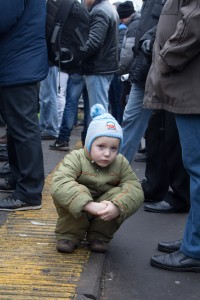In the first decade after Communism, Russia struggled to reframe one of the Soviet Union's biggest holidays: October Revolution Day [ru] (celebrated on November 7). After years of toying with new names for the celebration, the Kremlin in 2005 reinstituted November 4 as Unity Day to replace the problematic communist jubilee. Many criticized the government for (re)introducing yet another holiday with symbolic meaning that few contemporary Russians can appreciate.
This year, Unity Day lived up to its name, though in a rather unexpected way. In 46 towns and cities across Russia [ru], including Moscow, roughly 30 thousand people took part in far-right extremist rallies. While this is an infinitesimally small fraction of the country's total population, Unity Day's far-right groups have managed to attract supporters all over Russia. The geographic sweep of the demonstrations is impressive; they spanned Russia's western and eastern corners, crosscutting climates and demographics. The movement's organizers insist that their parades reached 70 towns and cities, drawing over 15 thousand people in Moscow alone.
LiveJournal user sofia_vb_88 argues that far-right activism in Russia grows not only in numbers, but also in boldness. This year's march proceeded despite attempts by the authorities to curtail demonstrations. Indeed, several activists were arrested [ru] outside their homes in Pyatigorsk, before that's city's Unity Day parade ever started. That the movement continues to attract followers despite such police pressure suggests a widespread network capable of replenishing its ranks when targeted with arrests.
Far-right activists also launched a page [ru] on LJ, where moderators scrupulously collect posts sympathetic to the movement. The writing quality is remarkable for a grassroots campaign, in this author's opinion, and approaches something close to a volunteer-supported newspaper.
One of the most confusing traits of extremist Russian nationalists is their apparent obsession with Nazi symbols and aesthetics. When the USSR defeated Fascist Germany, it was a wildly diverse ethnic coalition that elevated the Red Army to victory. Why would anyone valorize the Great Patriotic War as a triumph for Russians alone, and why do so by waving the flag of the enemy?
The movement itself exhibits great confusion about what unites its adherents. Photographs [ru] from the parade include signs and insignia borrowed from fascists, czarists, and even Celtics. That said, the leaders of the march offer a fairly simple core idea: “Russia for Russians” — a concept that many netizens are far from against. Many are, however, skeptical about the individual nationalists keen on realizing the slogan. Particularly, the right-wing's proposed means and methods arouse fears.
Photobloggers didn't miss the chance to cover the Unity Day marches. Readers can find reports from mikle1, politrash-ru, zyalt, and viktorlevanov (to name just a few). Mikle1 comments:
Вот посмотришь на лица этих людей, послушаешь их лозунги, и понимаешь – это не борцы за Русский Мир. И не защитники русских и России. Это люди или психически неадекватные, или донельзя малограмотные, или желающие под красивыми лозунгами бить, резать, стрелять. […] Они не едут на Кавказ добровольцами, не записываются в контрактники. Они выходят на улицы русских городов с призывами гнать своего соседа-инородца. Или не инородца – просто рожей не вышел или фамилия неправильная.
Look at the faces of these people, listen to their slogans, and you'll understand that they're no defenders of the Russian World. And they're no defenders of Russians or Russia. These people are either mentally handicapped, utterly illiterate, or they [just] want to go beating, cutting, and shooting [people] to the tune of pretty slogans. […] They don't volunteer [to serve] in the Caucasus, and they don't volunteer for the army. They go out into the street, trying to drive out their non-Russian neighbors. Or [sometimes] it's not even a non-Russian, but just someone with a suspicious mug or the wrong surname.
Filming with a hidden camera, blogger viktorlevanov was especially sarcastic in his comments:
Когда попал вчера на Русский Марш, подумал, что на Хэллоуин пришел – столько колоритных персонажей и все в масках.
When I got to the Russian March yesterday, it occurred to me that I'd arrived at a Halloween party — so many colorful personalities, all wearing masks.
Levanov went on to joke that demonstrators were battling an influenza epidemic, making light of that fact that many protesters wore hospital masks to disguise their identities and project an atmosphere of danger.
Blogger avmalgin questioned the capabilities of Russian nationalist extremists, remarking that Europe's better developed societies have struggled with their own ‘Muslim problem,’ so far unsuccessfully:
В Европе умные люди не могут сдержать исламизацию, а в Москве идиоты – смогут?
Smart people across Europe can't contain Islamization, but these dummies in Moscow will succeed?
Commenting on Malgin's post, non-Russian blogger tovbot described his experience as an ethnic minority in the USSR:
Я учился в советской школе в национальной республике и знаете – у нас даже не было урока родного языка, мы учили только русский язык и литературу. Мы не учили историю своего народа, мы учили историю России и русского народа.
I studied in a Soviet school in one of national republics of the USSR, and, you know, there wasn't even a single class on our native language — we studied only Russian language and Russian literature. We didn't learn the history of our own people — we studied the history of Russia and of the Russian people.
In their attemps to unite supporters around the idea of Russian superiority, the leaders of nationalist groups seem intent on turning back the clock and adopting a fundamentally Soviet approach to history, whitewashing a record of complex multiethnic accomplishments and setbacks, in order to uncomplicate and simplify the past. Therein lies the nationalists’ greatest problem: like so many other factions in Russian society, they have been unable to bridge the nation's Soviet heritage and post-Communist present. The confusion about nationalist symbols is just one of innumerable symptoms that still plague Russia. Before any social movement can pose a serious political threat to the country's ruling elite, it will have to distinguish itself on this pivotal question.









